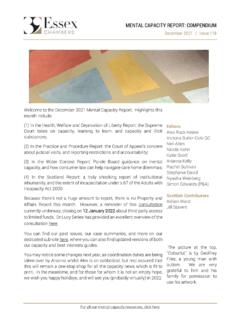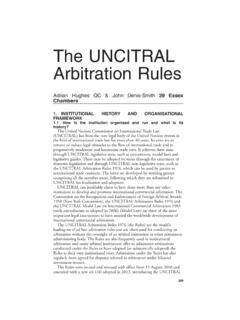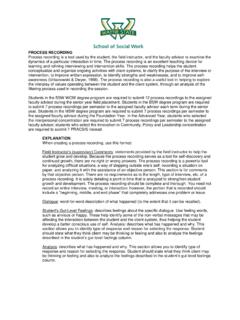Transcription of CARRYING OUT AND RECORDING CAPACITY ASSESSMENTS
1 CARRYING OUT AND RECORDING . CAPACITY ASSESSMENTS . May 2021. Editors A: Introduction Alex Ruck Keene 1. This purpose of this document is to provide for social Victoria Butler-Cole QC. workers and those working in front-line clinical settings an Neil Allen overview of the law and principles relating to the assessment Annabel Lee Nicola Kohn of CAPACITY . Its focus is on (a) how to apply the MCA 2005. Katie Scott principles when assessing CAPACITY ; and (b) how to record Katherine Barnes your assessment , primarily in the context of health and Simon Edwards welfare decisions.
2 Disclaimer: This 2. This document cannot take the place of legal advice. In any document is based upon case of doubt as to the principles or procedures to apply, it is the law as it stands as at always necessary to consult your legal department. In May 2021; it is intended particular, if it appears that the person in question is subject as a guide to good to undue influence or coercion, it is always vital to consult practice, and is not a your legal department as soon as possible to consider substitute for legal advice whether and how their interests are to be secured.
3 Upon the facts of any 3. The courts have now considered questions of CAPACITY on specific case. No liability many occasions, sometimes giving guidance as to how the is accepted for any Act should be applied in general terms, and sometimes adverse consequences of applying the Act to particular factual scenarios. reliance upon it. The picture at the top, _____--_____. Colourful, is by Geoffrey Files, a young man with 1. Useful guidance in relation to the questions that arise in the context of autism. We are very the management of property and affairs (called Making Financial Decisions grateful to him and his - Guidance for assessing, supporting and empowering specific decision- family for permission to making) can be downloaded for free at use his artwork.
4 For all our mental CAPACITY resources, click here 4. However, we give these references in footnotes for those who CARRYING OUT AND RECORDING CAPACITY ASSESSMENTS May 2021. Page 2. 4. We give references to cases in footnotes for those who want to read further: the key information is contained in the body of the Guide, in language which is hopefully not as legalistic as that sometimes adopted by the courts. 5. A note on language. The word assessment ' is in our experience all too often used to cover two completely different things: (1) the process of assessing whether or not a person has CAPACITY to make a decision; and (2) the RECORDING of the conclusion reached as to whether or not the person had CAPACITY .
5 It is important to keep the two concepts separate, in particular in circumstances where (too) many forms are labelled CAPACITY assessment ' when they are, in fact, forms to record the fact that the person does not have CAPACITY to make a relevant decision. Forms to record the outcome of CAPACITY ASSESSMENTS should enable the person completing them to set out that the person has CAPACITY if that is the outcome of the assessment . 6. It is also important to remember that an assessment for purposes of preparing a report on a person's CAPACITY (in any context) is a different thing to a clinical assessment , or an assessment for other therapeutic B: Key principles 7.
6 The core principles of the MCA 2005 are set out in They are: (2): a person (P4) must be assumed to have CAPACITY unless it is established that he lacks CAPACITY ;. (3): P is not to be treated as unable to make a decision unless all practicable steps to help him to do so have been taken without success;. (4): P is not to be treated as unable to make a decision merely because he makes an unwise decision;. (5): an act done, or decision made, under this Act for or on behalf of a person who lacks CAPACITY must be done, or made, in his best interests; and (6): before the act is done, or the decision is made, regard must be had to whether the purpose for which it is needed can be as effectively achieved in a way that is less restrictive of the person's rights and freedom of action.
7 8. The presumption that P has CAPACITY is fundamental to the Act. It is important to remember that P has to prove' nothing. The burden of proving a lack of CAPACITY to take a specific decision (or 3. See AMDC v AG & Anor [2020] EWCOP 58 at para 28(a) per Poole J, talking about a report to the Court of Protection, but equally relevant to any other report, including for purposes of DoLS. 4. Strictly, of course, P is not P' unless they are the subject of proceedings before the Court of Protection who is alleged to lack CAPACITY to take one or more decisions (Court of Protection Rules 2017, r ), but it is a convenient shorthand.)
8 For all our mental CAPACITY resources, click here CARRYING OUT AND RECORDING CAPACITY ASSESSMENTS May 2021. Page 3. decisions) always lies upon the person who considers that it may be necessary to take a decision on their behalf (or will invite a court to take such a decision). The standard of proof which must be achieved is on the balance of probabilities ( (4)). Accordingly, it will always be for the decision- maker to prove that it is more likely than not that P lacks CAPACITY . Precisely how the presumption plays out in situations where there is objective reason to believe that P lacks CAPACITY is addressed further at paragraphs 12 and 13 below.
9 9. Common phrases which suggest that the presumption is not being adopted include: One needs to be certain of her CAPACITY .. [P] is unable to fully understand, retain and weigh information. 5. 10. It is also important that it is the decision-maker who needs to have a reasonable belief that P lacks CAPACITY . In a court setting, the decision-maker is the judge; outside the court setting, it is the person who is proposing to take the step in question on the basis that it is said to be in P's best interests. 6 That does not mean that expert assistance cannot be sought (for instance as to whether the person has an impairment or disturbance of the mind or brain).
10 But it does mean that the decision-maker cannot delegate the decision as to CAPACITY to that expert. To give an example which occurs frequently in the clinical setting, if you are a doctor proposing to carry out a particular operation, you cannot delegate to a psychiatrist colleague the decision whether or not the person has CAPACITY . You may and in some complex cases may need - to get expert input from that psychiatric colleague, but it is ultimately you, as the treating doctor, to decide whether or not P. lacks CAPACITY . If you did not reasonably believe P lacked CAPACITY , and went ahead with the operation in what you thought was P's best interests, you will have no defence under MCA.




